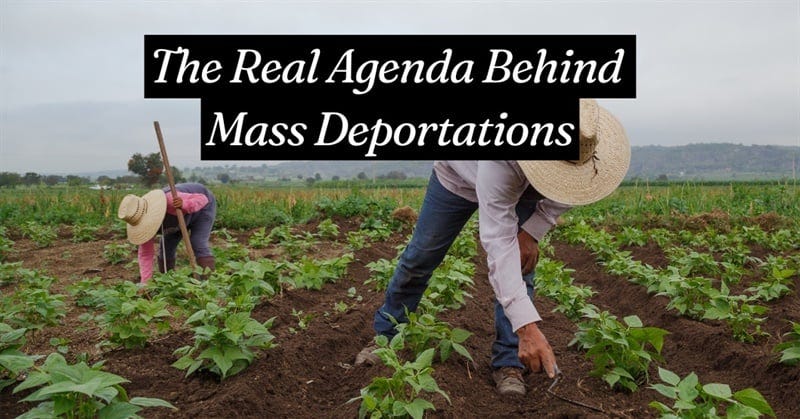The Real Agenda Behind Mass Deportations
Trump’s mass deportation plan, though framed as a way to protect American jobs, actually helps corporations exploit workers and harms the U.S. economy. Here’s how: 🧵
Labor Vulnerability:
Mass deportations create a climate of fear and instability for undocumented workers, making them more vulnerable to exploitation. Without legal protections, many undocumented immigrants are forced to accept low wages, long hours, and unsafe conditions, as they fear deportation if they speak up. This vulnerability is profitable for certain industries, particularly agriculture, construction, and service sectors, which rely heavily on immigrant labor.
Suppressing Wages for All Workers:
The threat of deportation limits undocumented workers' ability to advocate for fair wages and labor rights. This, in turn, keeps wages artificially low not just for undocumented workers but also for American-born workers in industries where immigrants make up a substantial portion of the workforce. By reducing wage pressure, companies maintain lower labor costs, maximizing their profit margins.
Increasing Black Market Labor Practices:
Deportations drive undocumented workers further into the shadows, pushing them into unregulated, informal labor markets. This leads to a rise in “under-the-table” employment where labor standards, taxes, and wages are all ignored. Corporations benefit from this unregulated labor pool, but it harms the economy by reducing tax revenue and increasing reliance on informal, insecure labor.
Lost Tax Revenue:
Undocumented immigrants contribute billions in taxes every year. Deporting them means a significant reduction in federal, state, and local tax revenue, which impacts funding for public services and infrastructure. The loss of this revenue harms the broader economy, as governments have fewer resources to invest in social services, schools, and public health systems that benefit all citizens.
Increased Costs of Enforcement:
Mass deportation is expensive. The U.S. government must allocate significant resources to law enforcement, detention centers, and deportation proceedings. This diverts funds from other critical areas that could boost economic growth, such as education, healthcare, and infrastructure. Instead, the money is spent on policies that destabilize communities and create a fearful workforce.
Stifling Entrepreneurship and Innovation:
Many immigrants, including undocumented individuals, start small businesses, creating jobs and stimulating local economies. Deporting them disrupts these enterprises, harms local economies, and removes a key driver of economic innovation. By contrast, immigrant-owned businesses are known to contribute disproportionately to job creation, especially in struggling communities.
Labor Shortages in Key Industries:
Mass deportations will drive severe labor shortages in essential sectors like agriculture and hospitality, where immigrant workers fill roles that are difficult to replace due to demanding conditions, seasonal work, and low wages.
A sustainable solution would ensure secure, fair working conditions and pathways to citizenship for immigrant workers, recognizing their essential role in the economy and our shared humanity. By protecting immigrant labor rights, we support a more just and resilient economy for everyone.
Bottom line:
While mass deportations are presented as protecting American workers, they actually reinforce exploitative labor practices that benefit corporations and suppress wages across the board. They also destabilize industries, increase government spending on enforcement, and reduce tax revenue, all of which collectively weaken the U.S. economy.
Mass deportations only make sense when we realize the true beneficiaries are corporations, not working-class Americans. It also doubles as a convenient way to scare voters into dehumanizing the "other," which distracts from the real danger: the politicians who use these tactics to covertly enrich the elite.




